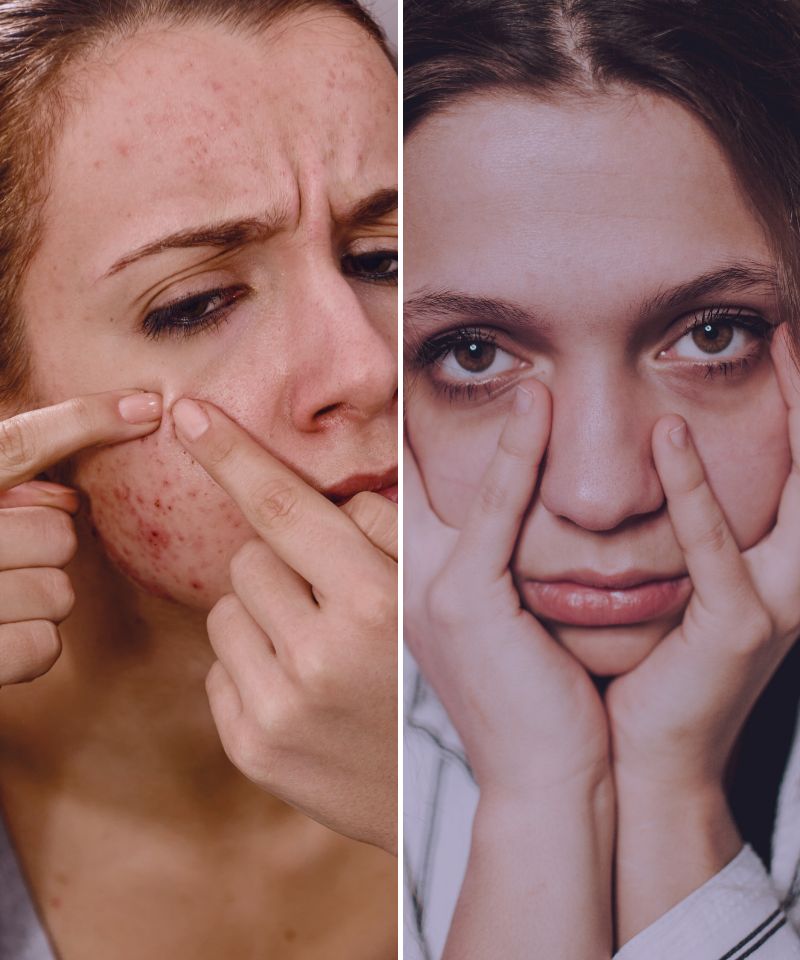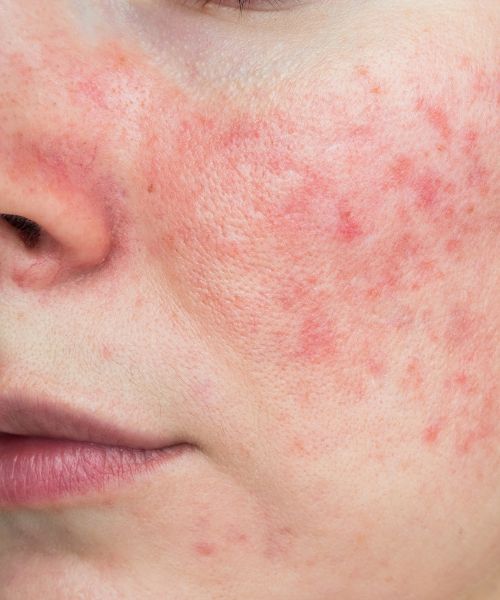Acne breakouts, flare-ups, and rashes tend to worsen when you are going through a stressful period.
The reason for this is that the mind and skin are connected, so as emotions are played out neurologically, stress, tension, and anxiety are widespread to be expressed through the skin.
Therefore, in this article, we will discuss the effects of stress on the skin, how to mitigate them, and help your skin stay healthy and look great despite the daily pressure.
Besides being one of the main factors that can contribute to high blood pressure, heart diseases, and even chronic sadness and depression;
Here are eight common effects of stress on the skin:
- Inflammation and Sensitivity.
- Impaired Barrier Function.
- Dryness and Dehydration.
- Acne.
- Accelerated Skin Aging.
- Undereye Bags.
- Aggravated Skin Disorders.
- Rashes.

The Science Behind How Stress Affects The Skin
The science behind stress and skin suggests that repeated exposure to psychological and environmental stressors can have lasting effects on your skin that go far beyond flushing or a short-lived stress rash.
Enter the brain-skin axis to the scene, an interconnected, bidirectional pathway that can translate stress from the brain to the skin and vice versa.
This occurs because stress triggers neurons in the hypothalamus, a small region of the brain located at the base, to secrete hormones that are transported to the pituitary gland.
The pituitary gland uses these messages to produce hormones that affect many bodily functions, including stimulating all the other hormone-producing glands to make their own hormones.
As a reaction to this complex process, the adrenal gland is stimulated, which allows the production of cortisol, commonly known as the primary stress hormone.
Cortisol is the hormone that becomes active when we sense danger and causes us to move and react in ways that would save us from this danger.
However, for this to happen, cortisol also causes inflammation, which isn’t normal or homeostatic for the body.
Over time, if this cortisol cycle remains active, it can direct immune cells from the bloodstream into the skin or stimulate pro-inflammatory skin cells.
Mast cells are a key type of pro-inflammatory skin cell in the brain-skin axis; they respond to the hormone cortisol through receptor signaling and directly contribute to a number of skin conditions.
Thus, science clearly connects stress with the decline in skin health.
But what visible changes can a prolonged state of stress bring to the skin?
8 Noticeable Effects of Stress on The Skin

Here are eight common stress effects on the skin:
Inflammation and Sensitivity
Stress is more than just an emotional state; it is a trigger for physiological reactions in our body, specifically via the release of a stress hormone known as cortisol.
When we’re under stress, our body goes into the so-called “fight or flight” mode, during which cortisol levels skyrocket.
Now, this hormone is necessary to make us react in a way that would save our lives in a dangerous situation, but it also triggers the immune system, leading to inflammation in the body.
This inflammation will manifest on our skin with symptoms such as redness, itchiness, and sensitivity, most frequently exacerbating existing skin conditions and making our skin more susceptible to sensitive reactions to external stimuli.
Impaired Barrier Function
Stress not only stirs up inflammation but also takes a toll on the skin’s protective barrier.
As cortisol levels rise, the skin’s ability to retain moisture takes a hit.
The result is a compromised barrier, making the skin more permeable and exposed to environmental pollutants, allergens, and irritants.
This can lead to sensitive reactions, allergies, worsening of existing skin conditions, and the appearance of new concerns.
Dryness and Dehydration
Not only does stress light the fire of inflammation, but it also steals away the skin’s natural defense system, leaving it vulnerable and thirsty.
When your body is constantly triggered to produce excessive amounts of cortisol, it reduces its ability to retain moisture.
The absence of moisture leads to dehydrated skin as well as redness, irritation, and the formation of dry patches and flakes, which can exacerbate skin texture.
Acne Breakouts
Increased acne severity is significantly associated with the spike in cortisol, which directly stimulates the oil-producing glands to produce excess oil to lubricate our skin and protect it from external pathogens in times of need.
However, when too much oil is produced, it will get stuck inside the pores instead of traveling to the skin’s surface, where it will harden and mix with other cellular debris, such as unshed dead skin cells, and attract a certain strain of bacteria to feed on it and proliferate.
This bacterial overgrowth will then trigger the immune system into producing inflammatory cytokines to fight off the intruders, ultimately leading to symptoms of redness and swelling we see on the skin’s surface as acne.
Therefore, stress can cause acne, and many people tend to break out during times of stress or prolonged emotional vulnerability, which is why it needs to be taken into consideration to manage this inflammatory condition effectively.
Additionally, besides its ability to cause acne through internal inflammation, stress can also interfere with our daily routine and make it hard for us to maintain a consistent and effective skincare regimen, which will further exacerbate the issue.
Accelerated Aging
Stress, especially chronic, can significantly accelerate the aging process of our skin.
A key factor in this is the effect stress has on collagen and elastin, the two major proteins that maintain the skin’s structure, strength, and elasticity.
When cortisol levels rise due to prolonged stress, it promotes the breakdown of these vital proteins, primarily collagen, which is responsible for providing our skin with structure and firmness.
As these fibers break down, the strength and elasticity of our skin diminish, leading to the formation of wrinkles, fine lines, and sagging skin.
Furthermore, when stressed or upset, we tend to make certain facial expressions, such as frowning, that can cause fine lines and wrinkles between the eyebrows and horizontal lines on the forehead.
If this is constantly repeated, the skin will eventually lose elasticity in the area, and it won’t be able to bounce back, leading to permanent wrinkles.
Undereye Bags
An often overlooked consequence of stress is the onset of undereye bags.
These puffy shadows become more pronounced when we’re under significant stress or experiencing sleep deprivation as a result of being stressed.
When our bodies are under stress, blood flow is primarily directed to the vital organs, leaving the skin looking pale and drained.
This can make the blood vessels around your eyes more prominent, resulting in dark circles.
Aggravated Skin Disorders
Stress can also wreak havoc on pre-existing skin conditions, exacerbating symptoms and making them harder to manage.
For example, stress can trigger rosacea flare-ups by causing the body to overheat, resulting in a flush that exacerbates redness.

In the case of psoriasis, a condition characterized by flaky patches of skin covered with silvery scales, stress acts as a common trigger that disrupts the immune system’s balance.
This causes it to overreact and speed up the production of new skin cells, leading to them becoming stuck together and forming new patches.
Similarly, stress can also worsen dermatitis, which is a condition that manifests on the skin as an itchy, red, and swollen rash due to impairing the skin barrier and making the skin more susceptible to react to a pathogen.
In summary, stress can magnify the symptoms of pre-existing skin disorders by influencing various physiological processes, ranging from immune function to cortisol production.
Rashes
Finally, stress can also lead to rashes, a condition often referred to as “stress rash,” which can last anywhere from a few hours to a few weeks.
This happens because when cortisol levels increase in response to stress, your body’s histamine response goes into action.
When histamine, a chemical released by our immune system, is released into the small blood vessels, it causes them to dilate, which causes a welt, and fluid oozes into the surrounding tissue, causing swelling and itching.
Additionally, the heightened state of alertness can worsen itching and other discomforts associated with a rash.
Consequently, those who are stressed might scratch more, which can further inflame the skin, exacerbate the rash, and even lead to wounds or infections.
Coping Strategies and Solutions
It is unrealistic to think that you can completely avoid stress, as we are all exposed to stressful situations at some point in our lives.
This is actually good because stress will trigger a chain reaction that will make us move and react in ways that might save our lives in dangerous situations.
However, while beneficial in some circumstances, prolonged periods of stress can have many drawbacks and severely affect our health and appearance.
One of the biggest issues with stress is that living with it for so long will trick our brain into thinking that it is a necessary part of our lives and make us accustomed to it.
This will lead to more difficulties as our bodies will be exposed to the negative effects of stress over time, and we won’t even know how to deal with it because we would think it’s a normal, everyday thing.
This is why coping with stress and managing its effects on your body is essential for good health, well-being, and improved appearance.
Here are a few ways to cope with stress and avoid its detrimental effects on the skin:
Stress Management Techniques

Stress management techniques are one of the most effective ways to calm down, get in touch with your emotions, and mitigate the effects of stress on your skin and health.
Here are some effective options that will help you manage your stress levels:
Mindfulness: Mindfulness is the practice of focusing your thoughts on the present moment. This can help reduce anxiety and improve mood, which can, in turn, reduce the severity of skin conditions aggravated by stress. By reducing the body’s stress response, mindfulness can help regulate the balance of hormones in the body, potentially improving skin health.
Meditation: Similar to mindfulness, meditation involves eliminating the stream of jumbled thoughts that may be crowding your mind and causing stress. Regular practice can lead to a reduction in stress, lowered cortisol production, and improved mental health.
Deep Breathing: Deep breathing exercises can help activate your body’s relaxation response which may slow your heart rate, lower your blood pressure, and reduce stress. By reducing stress, deep breathing can help soothe skin conditions triggered by stress, such as stress rash.
Diaphragmatic Breathing: This type of breathing helps restore balance in the body by moving the stomach rather than the chest with each breath, which leads to calming the nervous system. With practice, diaphragmatic breathing can help reduce stress, quiet the mind, and improve skin and health concerns caused by high cortisol levels.
Exercise: Regular physical activity helps maintain a healthy level of cortisol. It also promotes better circulation, which nourishes the skin by infusing it with oxygen and nutrients from the blood.
Incorporating these stress management techniques into your daily routine can be highly beneficial in managing stress levels and promoting overall skin health.
Remember, your skin is a reflection of your mental and physical well-being, and by taking steps to manage your stress, you’re not only helping your mind but also keeping your skin healthy and radiant.
Skincare Routine Adjustments
While stress might be wreaking havoc on your skin from the inside out, it doesn’t mean you are utterly powerless until you find a way to control this unpleasant emotion and the chain reaction it triggers.
Having a skincare routine consisting of products that work for your skin and address your concerns can go a long way in improving stress-exacerbated skin conditions such as acne, eczema, rosacea, psoriasis, etc.
For example, using gentle actives that accelerate processes such as cellular turnover and reduce bacterial overgrowth inside the pores can be beneficial in addressing acne.
On the other hand, using products with soothing ingredients, such as panthenol, niacinamide, and green tea extract, can help reduce inflammation and redness caused by dermatitis flare-ups.
Finally, moisturizers with skin-restoring and nourishing ingredients like ceramides, hyaluronic acid, and glycerin can help improve skin barrier function and support the skin’s natural moisture balance.
By implementing these skincare tips, you can help your skin stay nourished and hydrated during times of stress and reduce the potential of experiencing inflammatory skin conditions and discomfort.
Balanced Diet and Hydration
Consuming foods rich in vitamins, minerals, and antioxidants can significantly improve your skin’s health.
Vitamins A, C, and E are antioxidants that protect the skin from environmental damage and communicate with receptors in our bodies to encourage healing, which can help reduce stress-induced inflammation and support the health of our skin.
In addition, incorporating healthy fats like omega-3 fatty acids into your diet can directly help reduce inflammation and improve skin barrier function, which can help improve the skin’s resilience against external damage.
Finally, staying hydrated by drinking plenty of water throughout the day is essential to keep your skin looking and feeling its best.
While drinking plenty of water won’t directly clear up your acne or soothe your dermatitis, it will help improve the function of your lymphatic system, which is a secondary circulation system in the body that removes accumulated chemicals our skin absorbs from cleaning products, artificial hormones in some medications, bacteria, and viruses from our environment, and more.
Quality Sleep

Quality sleep plays a crucial role in skin repair and regeneration.
When we sleep, our bodies enter a state of restorative stillness, allowing our cells to repair, regenerate, and recover.
Skin cells, in particular, use this time to mend the damage incurred during the day from various factors like stress, sun exposure, and pollution.
This is also when the production of collagen, the protein responsible for keeping our skin elastic and youthful, is at its peak.
Lack of sleep, therefore, can lead to our bodies not regenerating properly and running on pure cortisol and adrenaline, which can cause inflammation and exacerbate skin conditions as well as signs of aging.
This is why improving your sleep quality is vital to keeping your skin healthy and vibrant.
To improve the quality of sleep, consider establishing a calming bedtime routine.
This can include activities like reading, meditating, or taking a warm bath.
It’s also important to limit screen time before bed, as the blue light from electronic devices can interfere with the production of melatonin, a hormone that regulates sleep.
Additionally, optimizing your sleep environment can also contribute to better sleep.
Try to keep your bedroom dark, quiet, and cool, as these conditions are believed to be most conducive to a good night’s sleep.
Furthermore, consider investing in a comfortable mattress and pillows, and use bedding made from natural fibers, which can help regulate body temperature and moisture.
By ensuring you get a good night’s sleep, you’re not only helping your skin to repair and regenerate, but you’re also setting the stage for a healthier, more glowing complexion.

My name is Simone and I am a certified skin specialist. I created this website to teach my readers how to take great care of their skin and I also like to occasionally share my honest opinions on skincare products I’ve tried. You can learn more about me here.
